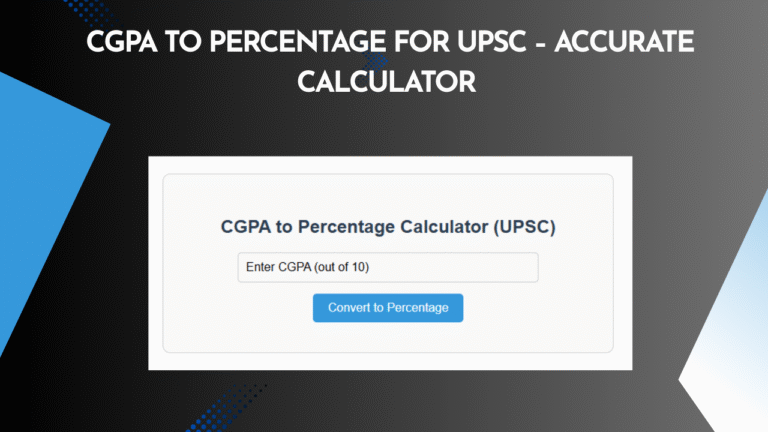Semester Grade Calculator: How to Calculate Your Final Grade
Understanding how your final grade is calculated for the semester is important for every student. It helps you track your academic progress and plan your study schedule more effectively. Whether you’re aiming for a specific target or just trying to pass the course, a semester grade calculator can be a very helpful tool. In this guide, we will explain what a semester grade is, how to calculate it, and how to use a calculator to plan your goals.
Semester Grade Calculator (SGPA)
Also Check : Middle School Gpa Calculator
What is a Semester Grade?
A semester grade is your final score for a particular subject at the end of the term. This score is not based on one single exam or test. Instead, it includes all the work you’ve done throughout the semester—such as homework, quizzes, class participation, assignments, midterm exams, and final exams.
Each of these components contributes differently to your final grade. This is because each one has a weight. For example, a final exam may be worth 30% of your total grade, while homework may be worth 20%. The final grade is calculated using a method called weighted average.
How is a Semester Grade Calculated?
To calculate your semester grade, follow these steps:
- Convert each weight from a percentage to a decimal.
For example, 30% becomes 0.30, 20% becomes 0.20, and so on. - Multiply each score by its weight in decimal form.
For instance, if your quiz score is 80% and quizzes are 20% of the grade, then:
0.20 × 80 = 16 - Add all the weighted scores together.
The total gives your final semester grade.
Here’s a simple formula:
- Final Grade = (Score₁ × Weight₁) + (Score₂ × Weight₂) + (Score₃ × Weight₃) + this formula helps you understand how each part of your coursework affects the final grade.
Example of Weighted Grade Calculation:
Let’s take an example where the weights and scores are:
- Homework: 20% weight, 85% score
- Quizzes: 20% weight, 80% score
- Midterm Exam: 30% weight, 75% score
- Final Exam: 30% weight, 90% score
Now, let’s do the math:
- Homework: 0.20 × 85 = 17
- Quizzes: 0.20 × 80 = 16
- Midterm: 0.30 × 75 = 22.5
- Final Exam: 0.30 × 90 = 27
Add them all together:
- 17 + 16 + 22.5 + 27 = 82.5 So, your semester grade is 82.5%.
Also Check :
What Information Do You Need to Use a Semester Grade Calculator?
Before you start using a grade calculator, you should gather the following details:
- Your scores in homework, quizzes, assignments, midterm, and final exam
- The weight of each component (in percentage)
- The grading scale your school uses (percentage or letter grade)
Once you have this information, the calculator can show your current standing and help you predict your final grade.
How Much Does the Final Exam Matter?
In many subjects, the final exam is the most heavily weighted component. It can be 30%, 40%, or sometimes even more. Because of this, the final exam has a big effect on your overall grade.
A good score on the final can raise your grade significantly, especially if your earlier scores were low. On the other hand, a poor final score can lower your average even if you did well earlier in the semester. This is why it’s important to understand how much weight the final exam carries in your course.
What’s the Difference Between GPA and Semester Grade?
Students often confuse semester grades with GPA, but they are different:
- A semester grade is the final result for a single subject in one term.
- GPA (Grade Point Average) is the average of all your grades over time, usually across multiple subjects and semesters.
GPA also uses credit hours to determine the weight of each course in the overall calculation. For example, a 4-credit course will affect your GPA more than a 2-credit course. However, credit hours are not used in semester grade calculations for individual subjects.
Can You Still Pass if You Fail the Final Exam?
Yes, passing is still possible if your scores in other areas (like homework and midterms) are strong. If the final exam has a lower weight, it won’t affect your final grade as much.
However, if the final exam carries a high percentage (like 40%), failing it could bring down your overall grade significantly. That’s why it’s important to do well in all components throughout the semester and not rely only on the final.
Semester Grade Calculators: Questions and Answers:
| Question | Answer |
|---|---|
| What is a semester grade calculator 4 quarters? | Calculates semester grade by averaging 4 quarter grades. |
| How does a semester grade calculator GPA work? | Calculates GPA using course grades and credit weights. |
| What is the semester grade calculator for Palm Beach County? | Uses Palm Beach County grading rules to compute semester grades. |
| How does a semester grade calculator without final exam work? | Calculates semester grade excluding the final exam score. |
| What is a semester grade calculator 3 six weeks? | Calculates semester grade based on three six-week grading periods. |
| How does a semester grade calculator work in the UK? | Uses UK grading scale and credit system to calculate grades. |
| What is a semester grade calculator with no final exam? | Calculates grade without including a final exam score. |
| How does the Broward semester grade calculator work? | Uses Broward County’s grading policies to calculate semester grades. |
| What is a college semester grade calculator? | Calculates semester grades with weighted course grades and credits. |
What Grade Scale is Commonly Used?
Most schools use either a percentage scale or a letter grade scale. Here’s a typical example:
- A = 90–100%
- B = 80–89%
- C = 70–79%
- D = 60–69%
- F = Below 60%
Some schools also use a GPA point scale, such as:
- A = 4.0
- B = 3.0
- C = 2.0
- D = 1.0
- F = 0.0
It’s important to check with your school to know which system they follow.
How to Use a Grade Calculator to Set Goals:
One of the best uses of a grade calculator is to plan ahead. You can use it to answer questions like:
- “What score do I need on the final exam to get an A?”
- “If I scored 75% on the midterm, how much do I need on the next test to pass?”
By adjusting the numbers, you can create different “what-if” scenarios. This helps you manage your time better and focus your energy on the most important tasks.
Frequently Asked Questions (FAQ)
What is a semester grade?
- A semester grade is the total grade you receive for one academic term. It combines your performance in homework, quizzes, tests, midterms, and final exams based on their assigned weights.
How do we factor in the final exam?
- To factor in the final exam, multiply your final exam score by its percentage weight (converted to a decimal), then add it to the weighted scores of other components. This gives you its impact on your final grade.
Is GPA the same as a semester grade?
- No, GPA and semester grade are different. A semester grade reflects your performance in one class during one term. GPA is an average of grades from multiple classes, often across multiple semesters, and includes credit hours.
Can we still pass with a bad exam score?
- Yes, you can still pass the course if your scores in other areas—like homework, quizzes, or midterms—are strong enough to balance out the low exam result. It depends on the exam’s weight and your earlier performance.
What do we need for grade calculation?
To calculate your semester grade accurately, you need:
- The actual scores for each course component (homework, quizzes, exams, etc.)
- The weight (percentage) assigned to each component
Final Thoughts:
Semester grade calculators are simple but powerful tools. They help you understand where you stand academically, how each assignment or test affects your final grade, and what you need to do to reach your goals. By keeping track of your scores and weights, you can avoid surprises at the end of the term and take control of your performance. Whether you’re aiming for top grades or just trying to pass, using a semester grade calculator can make your academic life a lot easier and more predictable.






